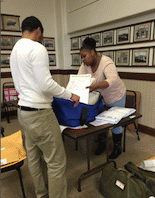My guest today is Virginia Martin, Democratic election commissioner of Columbia County, New York. Welcome to OpEdNews, Virginia.
JB: Your county is unique in the state of New York in the way that its votes are counted. Can you tell us about that, please?
VM: Thanks, Joan. Yes, in Columbia County, my Republican counterpart, Jason Nastke, and I have a standing agreement that, going into every election, and for every contested race, we will hand count 100% of the votes cast on our voting machines. New York State Election Law only requires each county to count all the votes on 3% of the voting machines that were deployed, but we don't feel that that's an adequate audit, and so we do more. In reality, though, it's never really 100% of all the votes cast, because, after the unofficial voting-machine results are in on election night, there are some races that we agree just don't warrant more than the 3% NYS audit. The commissioner on the losing side of a race that was anticipated to be fairly lopsided will, at her or his discretion, ask the candidate and the party if they would agree to forego the 100% audit. They always have, with the result that there are quite a few races that we don't do the 100% hand-count on, because there also are generally a number of races with only one candidate. Interestingly, for this election the machine that we randomly drew for the 3% NYS audit is a single-district machine in a town where there are no contested local races.
JB: Let's back up a few steps, Virginia. How long has Columbia County been using this method and how did it come about?
VM: We've been hand-counting ballots since 2010, which is when counties across New York State were required to use optical-scan instead of lever voting machines. I joined the Columbia County Board of Elections, as Democratic Commissioner, in December 2008. At first, I was only superficially aware that new machines would be coming. But as I learned more about those electronic machines, and more about the reliability and safety of lever machines, I, along with my Republican counterpart, joined with an effort across the state to retain the lever machines, which frankly had served us well. Those machines had been designed in the late 1890s to prevent the electoral fraud that was rampant with the existing technology, which was paper-ballot voting. Lever machines were exceedingly reliable, if they were properly maintained and if party officials conducted their legally authorized tests and oversight. Their operations were mechanical and easy to understand. They made machine tampering infeasible, since tampering could only be accomplished by physically adjusting every machine, a risky, time-consuming, and laborious process that was likely to be discovered either during tampering or on election night when completely unexpected and odd-looking vote counts resulted.
The dozen or so county legislatures that had resolved to continue using lever machines did not prevail. The reason was partly because, in 2006, New York State had earned the disapproval of the Justice Department for failing to transition to voting machines that were accessible by the disability community as required by the 2002 federal Help America Vote Act. The issue was further complicated by the state's passage of its own election-improvement law, the 2005 Election Reform and Modernization Act, which mandated electronic machines, which the earlier HAVA law had not done. So the Justice Department sued New York State, requiring it to implement its own law. Thus we could not continue using lever machines. (I and others had argued that lever machines, coupled with ballot-marking devices for those with disabilities, would satisfy HAVA's requirement for access.) Further complicating the issue is that the state had accepted HAVA money for the purchase of new machines, and, indeed, prior to my joining the Board, Columbia County had purchased new machines, utilizing those funds.
I testified before the NYS Assembly's Election Law Committee in 2009, complimenting several of the state's excellent initiatives to comply with HAVA, but asking for reconsideration of the lever machines. In addition to citing the outsized costs of elections run on electronic machines, I outlined the ways that elections could be tampered with. I testified that the 3% audit (of machines deployed) would not satisfy my need to know and understand that electronically produced results were accurate reflections of how the voters voted, and that, if forced to use the electronic machines, I would not certify an election unless all the ballots were counted. That caused quite a stir.
As we neared the 2010 elections, and with my counterpart's knowledge and approval, of course, I consulted with the State Board of Elections, and asked if we could deploy the ballot-marking devices, use paper ballots, and collect them in secure ballot boxes to be hand counted, skipping the scanning step altogether. Our reasoning was that the cost of conducting the election would be considerably diminished since we wouldn't have to test, operationalize, and secure the scanners. I was advised that, given the Justice Department's ruling, the scanners would have to be used, but that hand-counting all the ballots after they were scanned would be acceptable. And so that's what we did, and have done ever since.

Reconciling: process (opening the ballot bag and accounting for all ballots); Republican and Democrat
(Image by Virginia Martin) Details DMCA
JB: I agree with you that electronic voting machines lack most if not all of the safeguards of the lever machines they replaced. How have your constituents reacted to the way votes are counted in Columbia County?
VM: Initially, there was widespread strong support for keeping the lever machines. When we were forced instead to use the scanners to tabulate votes, there was broad understanding that we had to hand count the ballots to see how accurate the machines were. At the same time, there were some who dismissed us as Luddites; they saw our rejection of the state's directive to use a counting system almost exclusively conducted by computer as anachronistic. Many of my Democratic colleagues were not convinced that we were justified in our position. Support was stronger on the other side of the aisle.
Then, after a couple of years passed, and as we saw that the machines were doing a good job of counting the votes (although it was clear that they could not always discern voter intent), there were those who felt that those years represented a "test period," and that we should trust the machines, going forward, and conduct only the much smaller state-required audit. However, my co-commissioner and I recognized that there were a number of reasons why a robust audit is required after every election, so we repeatedly found ourselves explaining those reasons to naysayers.
Yet, as time has passed, more of my constituents are understanding the vulnerabilities of electronic vote-counting, and they are very pleased that their county is distinguished by being so transparent. Every time an election is won (or lost) by one, or a handful, of votes, my constituents recognize anew the importance of knowing for sure that we have fully revealed the vote count, and that it reflects the voters' intentions. They are impressed when in a close race we inform them that one or the other candidate has won a vote that the machine hadn't correctly counted (even if the change doesn't go their way). They certainly never express any distrust in our system. In fact, they are highly trusting of it. That's not to say that everyone likes it, nor can I estimate what percentage of voters like it. But nobody ever accuses the vote counts of being suspect.
JB: I think that's what it's all about, your constituents trusting that the process is going to accurately reflect voter intent, whatever that intent is. So, that's all good. But, is your M.O. only viable in an area or district with a small population? Could it be extrapolated more widely? What are your thoughts on this?
(Note: You can view every article as one long page if you sign up as an Advocate Member, or higher).






